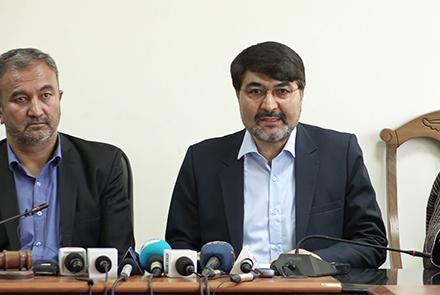Lawmakers from Ghazni province on Tuesday said the plan by the Independent Election Commission of Afghanistan (IEC) to conducted zone-based elections in Ghazni is in contradiction to the law and it is “totally biased”.
They said the decision made by the election commission is unacceptable.
Ghazni MPs warned to resist what they described as a “discriminatory act” by the Independent Election Commission.
“Conducting zoned-based elections in Ghazni and different from other provinces is a clear discrimination against the right of the people of Ghazni and it is unacceptable,” said Abdul Qayum Sajjadi, an MP from Ghazni.
Last month, Ghazni residents forced the IEC to close its provincial office until government either ensures security in the province or reduces the size of election constituencies.
The closure of IEC provincial office disrupted the voter registration process. But now the IEC has decided to divide Ghazni into zones ahead of October 20 parliamentary and district councils’ elections.
The IEC is planned to carry out voter registration center in accordance to a new electoral calendar.
“The Constitution and the election law state that the commission shall pave the ground for elections to the entire people of Afghanistan and all ethnicities in the country. This is the decision which we have taken is in line with the law,” said IEC commissionor Sayed Hafiz Hashemi.
Ghazni has 11 seat reservations in Afghanistan’s Wolesi Jirga (Lower House of Parliament). But in the past elections, the entire candidates made their way to the parliament from a certain ethnicity after the polling was not conducted in some insecure regions.
“The people of Ghazni have the right to pick their representatives from all districts through ballots and the solution is that government should pave the way for the people to go to the polling stations,” added Sajjadi.
Based on the IEC decision, Ghazni has been divided into three electoral zones. The candidates who secure majority of the votes from these zones will be declared as winners.
IEC however clarifies that all zones have been divided based on the population and geography and a committee will carry on the process.
According to local officials, at least 14 districts in the province face serious security threats and 15 voter registration centers remain closed in the center of the province.
Two days ago, Ghazni activists and residents accused the Afghan government of not having the commitment to resolving issues relating to the election process in the province.
Activists said neither the IEC nor government have the will to conduct free and transparent elections in Ghazni.
They said it has been weeks since problems arose over the election process in Ghazni and nothing has been done to resolve the issues.
Ghazni activists also opposed the plan for zone-based elections in Ghazni province. In addition, security threats and the non-delivery of election material are among the problems regarding elections in the province.
Afghanistan’s parliamentary and district council elections are scheduled for 20 October.


